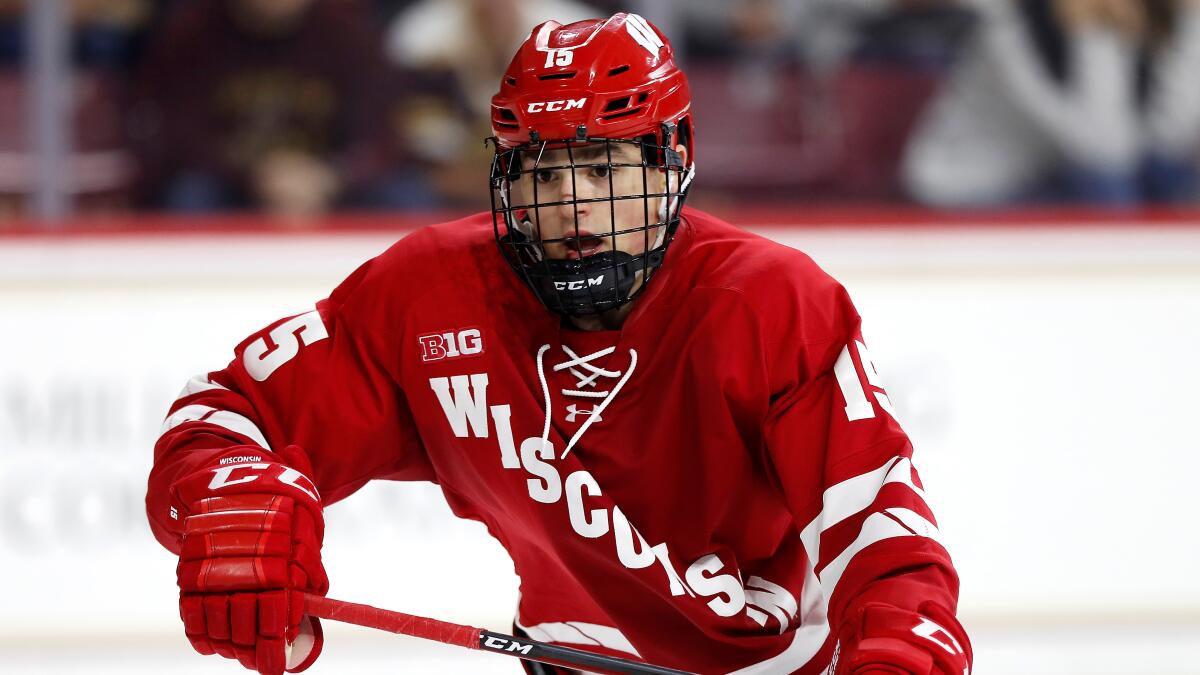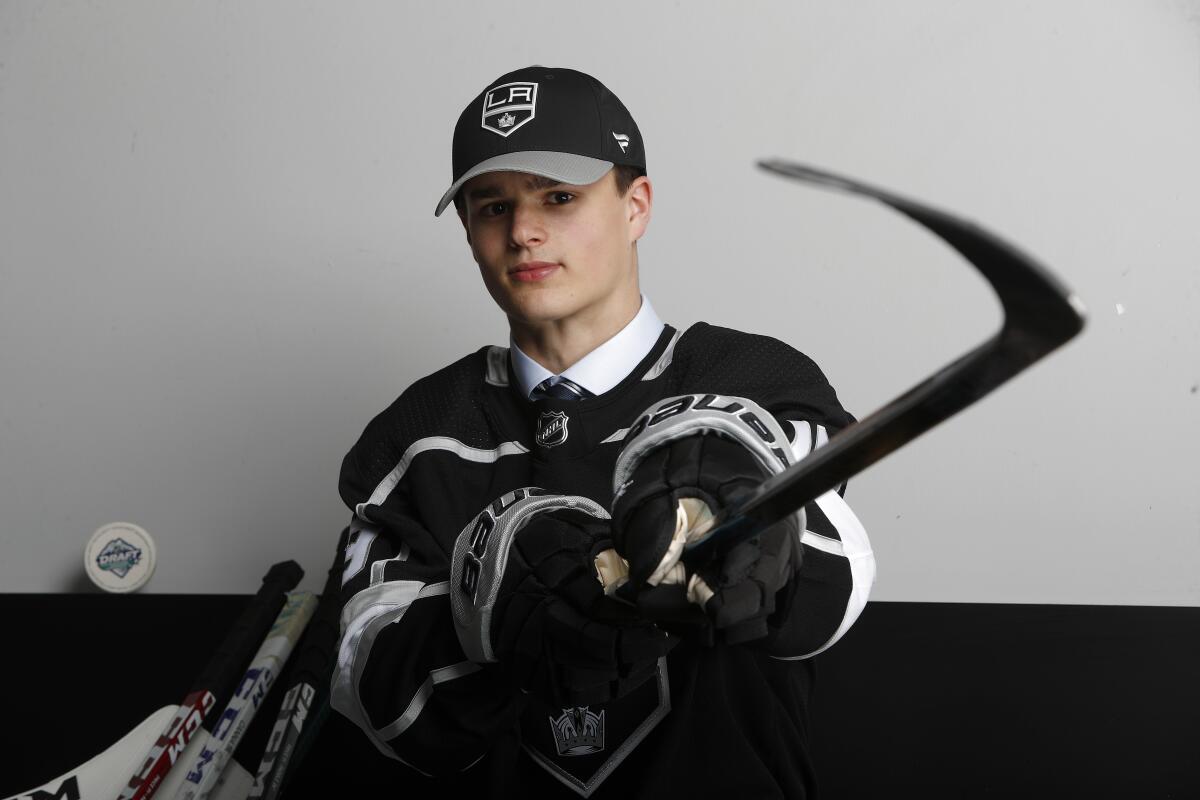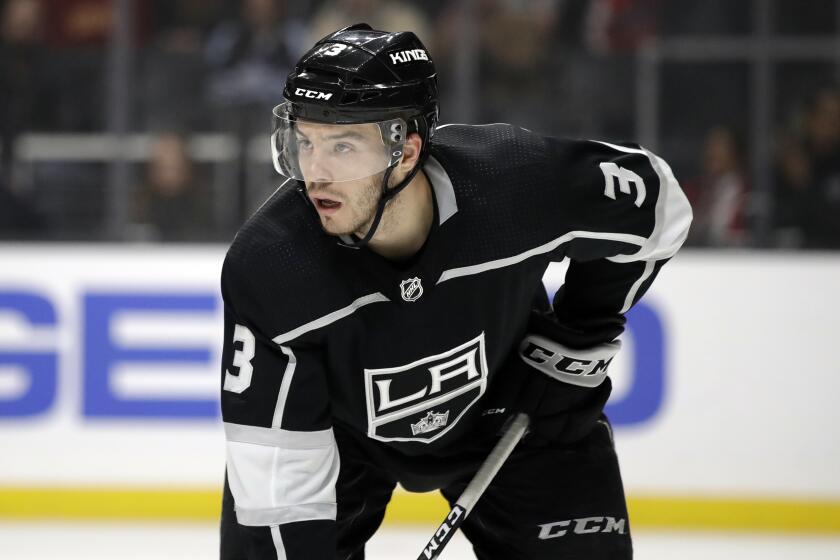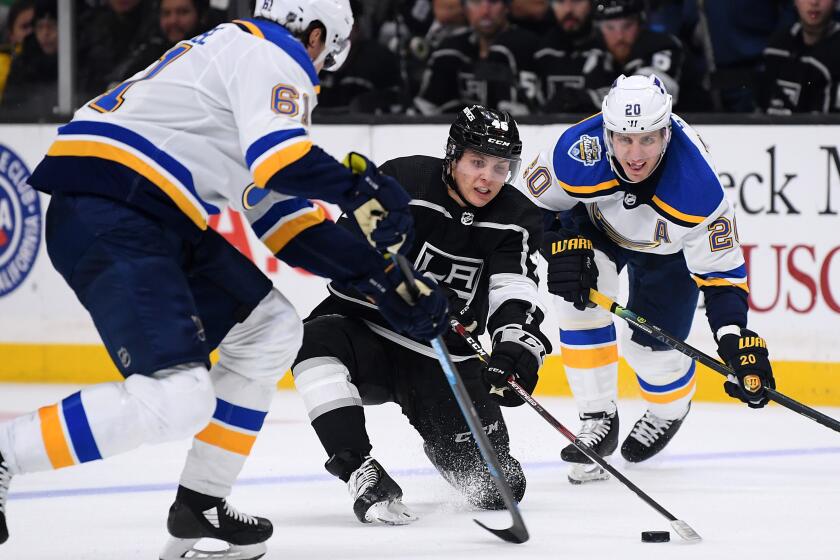Kings prospect Alex Turcotte finding way to NHL with gap year at Wisconsin

- Share via
MADISON, Wis. — With an impish grin and shallow dimple cratering on his right cheek, Alex Turcotte tried to explain himself.
While most students traverse the University of Wisconsin’s tree-lined lakeside campus by foot, a group of freshmen on the Badgers’ hockey team has concocted a different workaround.
“We just Uber,” said Turcotte, the 18-year-old prospect whom the Kings drafted fifth overall this past summer, and who is now playing his first and possibly only season of college hockey. Leaning against a wall after a recent practice, Turcotte half-chuckled, then expounded upon the ride-share rationalization.
For one, there’s the length of the walk between the math and animal science classes that several players have in the afternoons. Turcotte, who doesn’t have a car of his own in Madison, says it’s a 25-minute hike. His roommate, Dylan Holloway, says it’s closer to 40 but “feels like almost an hour.”
There’s also Bascom Hill, a beautiful yet inconvenient landmark situated between the academic corridor of campus, near the windswept shore of Lake Mendota, and the Badgers’ practice facility, nestled in the opposite corner of the university grounds. On other occasions, the reasoning is simpler.
Kings rookie Matt Roy struggled at first, and coach Todd McLellan let him know about it. Since then, he’s become one of the team’s top defensemen.
“Sometimes when it’s cold out,” Holloway said, “we just don’t feel like walking.”
Whatever the case, Turcotte need not defend his decision. Not anymore anyway. Perhaps in the past, cutting even such a harmless corner might have brought consequences. But he’s an adult now, suddenly bestowed with a level of independence and freedom that, even counting his time as a top junior prospect, he has never truly experienced before.
That’s largely why he came to college in the first place: to learn lessons about life while putting the finishing touches on his game.
“Making mistakes in games and practice, you can learn from it — and learn how to handle it here, where it’s not under a microscope,” Turcotte said, donning a red Wisconsin short-sleeve shirt while emphasizing the benefits of his current setting. “Get better from that as a person, and a player.”
Turcotte’s path as a youth was structured and streamlined. Growing up outside Chicago in a hockey family — his father, Alfie, played in parts of seven NHL seasons — he was quickly tagged as a prodigal prospect.
At 16, he moved to Michigan to play for the same USA Hockey National Team Development Program that produced such NHL All-Stars as Patrick Kane, Jack Eichel and Auston Matthews. In two seasons, Turcotte left his own legacy, wowing scouts with his quick stick and nonstop motor while flying up draft boards. He became the Kings’ earliest selection since they took Brayden Schenn at No. 5 in 2009.
He could have jumped straight to the pros or continued playing junior hockey. Instead, he came to Wisconsin to expand his horizons, becoming the latest top-ranked prospect to take a de facto NCAA “gap year” after being drafted.
“It’s not easy,” said Nelson Emerson, the Kings’ director of player personnel. “It’s a challenge. You’re away from home. You’re on your own. You have to establish an organized schedule and an organized formula to have everything work.”
The Kings had been playing a little better in recent games, but Monday’s 4-1 loss to the St. Louis Blues shows how much the team needs to grow.
With the U.S. Development Program, Turcotte’s days were regimented down to the minute, bookended by a 6 a.m. wakeup call and a late-afternoon practice that stretched until sundown. He has found his college routine to be far more fluid. His responsibilities have heightened, but so too have his opportunities for self-determination.
“In high school, they’re holding your hand, there are a lot more assignments,” he said. In college, “you pick and choose your spots on when to study. You don’t need to stress over it as much.”
Turcotte — who this week will represent the United States at the under-20 World Junior Championships in the Czech Republic — has conflicting feelings about this new reality. “The freedom part, I definitely like,” he said. But, he concedes, “It’s got its pros and cons.”
Pro: Most nights, he relaxes in the single-room dorm he and Holloway share. While Holloway usually plays “Fortnite” on their side-by-side televisions, Turcotte splits his screen time between “Call of Duty,” NHL video games and Netflix (“Peaky Blinders” and “Stranger Things” are often queued up).
Con: Dorm living fails to check many comforting boxes of home life, from the disappointing food on down.
“I really miss being around a family environment, having meals, being around people that care about you a lot and spending time with them,” Turcotte said. “That’s the biggest thing that you kind of miss out on. But I guess that’s part of growing up too.”
Revelations like this are what make the NCAA experience so valuable. It’s a gradual buffer before breaking into the NHL, providing stepping stones on which Turcotte can find his footing as a player and a person.
“There’s a lot of responsibility,” said Wisconsin coach Tony Granato, a former Kings player who remains close with many in the club’s front office, including President Luc Robitaille and general manager Rob Blake. “That only helps you mature and grow, learn life skills outside the game of hockey that are going to be very valuable when it gets that way. You come in here as kids, and you’ve got to grow up fast.”
Granato’s on-ice critiques for Turcotte, who entered the holiday break with six goals and 15 points in 16 games, have been limited. The 5-foot-11, 185-pound center continually sharpens his game on his own, studying such current NHL players as Anze Kopitar, Jonathan Toews and Nathan MacKinnon, watching and rewatching clips of their highlights to look for techniques that might mesh with his style.

But, mentally, Granato sees plenty of room for Turcotte to grow. He points out the player’s razor-sharp competitive edge as a blessing and a curse.
Sometimes it can carry him to new heights, like when Turcotte battled back from a mononucleosis diagnosis this past spring to finish his season and graduate from high school on time. But it can hold Turcotte back too. In his last six games of the semester, Turcotte failed to record a point — the struggles of playing at the NCAA level snowballing from one night to the next.
“He’s hard on himself,” Granato said. “He pushes himself and demands a lot of himself. Some of it is detrimental toward his performance because he gets so wound up in it. I think that’s part of the growth part. Learn to control it, use it in a positive way.”
Once again, the college atmosphere serves as the perfect incubator.
“I know I’m still 18,” Turcotte said. “I know it’s not the end of the world. But if you’re going to make mistakes, you make them. You’ve got to learn from them and try to become better from them. Whether it’s in practice or games, it’s going to happen eventually. It happens to everyone. Even the best players in the NHL have gone through slumps. They always get through it because they’re the hardest workers.”
Turcotte wants to be all of the above: a top player, a tireless worker, the face of a franchise. He knows it’s what’s expected of him, and he already feels the weight on his back. He is expected to compete for a roster spot with the Kings next season.
But for now, he’s still learning how to get to the NHL, using college as a means to tiptoe toward his future, one adjustment at a time.
“It’s up and down. There’s the good moments and the bad moments,” he said. “But I think it’s like that for everything. There’s definitely been some adversity. Learning from that can only help me.”
More to Read
Go beyond the scoreboard
Get the latest on L.A.'s teams in the daily Sports Report newsletter.
You may occasionally receive promotional content from the Los Angeles Times.









